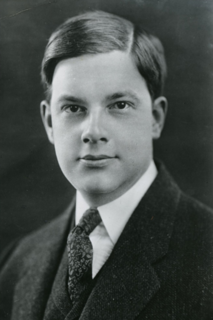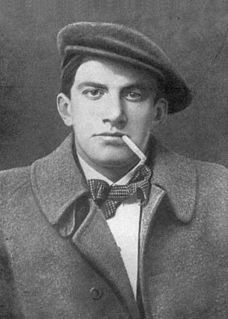September 1913 may refer to:
- September 1913 (month), a 30-day month that began on a Monday
- September 1913 (poem), a poem by W. B. Yeats
September 1913 may refer to:

Edward Estlin Cummings, often styled as e e cummings, was an American poet, painter, essayist, author, and playwright. He wrote approximately 2,900 poems, two autobiographical novels, four plays, and several essays. He is often regarded as one of the most important American poets of the 20th century. Cummings is associated with modernist free-form poetry. Much of his work has idiosyncratic syntax and uses lower-case spellings for poetic expression.
A fugitive is a person fleeing from arrest.

Ezra Weston Loomis Pound was an expatriate American poet and critic, a major figure in the early modernist poetry movement, and a fascist collaborator in Italy during World War II. His works include Ripostes (1912), Hugh Selwyn Mauberley (1920), and his 800-page epic poem, The Cantos (c. 1917–1962).

Georg Trakl was an Austrian poet and the brother of the pianist Grete Trakl. He is considered one of the most important Austrian Expressionists. He is perhaps best known for his poem "Grodek", which he wrote shortly before he died of a cocaine overdose.

Alfred Joyce Kilmer was an American writer and poet mainly remembered for a short poem titled "Trees" (1913), which was published in the collection Trees and Other Poems in 1914. Though a prolific poet whose works celebrated the common beauty of the natural world as well as his Roman Catholic religious faith, Kilmer was also a journalist, literary critic, lecturer, and editor. At the time of his deployment to Europe during World War I, Kilmer was considered the leading American Roman Catholic poet and lecturer of his generation, whom critics often compared to British contemporaries G. K. Chesterton (1874–1936) and Hilaire Belloc (1870–1953). He enlisted in the New York National Guard and was deployed to France with the 69th Infantry Regiment in 1917. He was killed by a sniper's bullet at the Second Battle of the Marne in 1918 at the age of 31. He was married to Aline Murray, also an accomplished poet and author, with whom he had five children.

Osip Emilyevich Mandelstam was a Russian and Soviet poet. He was one of the foremost members of the Acmeist school.

Vladimir Vladimirovich Mayakovsky was a Russian and Soviet poet, playwright, artist, and actor.
"In A Station of the Metro" is an Imagist poem by Ezra Pound published in April 1913 in the literary magazine Poetry. In the poem, Pound describes a moment in the underground metro station in Paris in 1912; he suggested that the faces of the individuals in the metro were best put into a poem not with a description but with an "equation". Because of the treatment of the subject's appearance by way of the poem's own visuality, it is considered a quintessential Imagist text.

John Grosvenor Rowland is an American politician, author, and convicted felon who served as the 86th Governor of Connecticut from 1995 to 2004. He served two nonconsecutive prison terms on various corruption charges. A Republican, Rowland previously served in the United States House of Representatives from 1985 to 1991, representing the state's 5th district. In 2004, Rowland resigned from office during a corruption investigation, and later pleaded guilty in federal court to a one-count indictment for conspiracy to commit honest services fraud, mail fraud and tax fraud. He was the first Connecticut governor to be elected to three terms since 1784.
Wanderer, Wanderers, or The Wanderer may refer to:
Events from the year 1913 in Ireland.
Claude Debussy's Préludes are 24 pieces for solo piano, divided into two books of 12 preludes each. Unlike some notable collections of preludes from prior times, such as Chopin's Op. 28 preludes, or the preludes from Johann Sebastian Bach's The Well-Tempered Clavier, Debussy's do not follow a strict pattern of tonal centers.
A prelude is a musical form. It may also refer to:

Rabindranath Tagore was a Indian polymath – poet, writer, playwright,composer, philosopher, social reformer and painter. He was a fellow of the Royal Asiatic Society. He reshaped Bengali literature and music as well as Indian art with Contextual Modernism in the late 19th and early 20th centuries. Author of the "profoundly sensitive, fresh and beautiful verse" of Gitanjali, he became in 1913 the first non-European to win the Nobel Prize in Literature. Tagore's poetic songs were viewed as spiritual and mercurial; however, his "elegant prose and magical poetry" remain largely unknown outside Bengal. He is sometimes referred to as "the Bard of Bengal".
The Bells may refer to:
Nationality words link to articles with information on the nation's poetry or literature.

Herman Wildenvey, born Herman Theodor Portaas, was one of the most prominent Norwegian poets of the twentieth century. During his lifetime he published 44 books of his own poetry, in addition to translations of William Shakespeare, Ernest Hemingway, and Heinrich Heine. He was married to the novelist Gisken Wildenvey.

A birthstone is a gemstone that represents a person's period of birth that is usually the month or zodiac sign. Birthstones are often worn as jewelry or as a pendant necklace.
"September 1913" is a poem by W. B. Yeats. The poem was written midway through his life as a highly reflective poem which is rooted within the turbulent past. Most notably, the poem provides insight into Yeats' detestation of the middle classes whilst also glorifying figures such as John O'Leary.
Krishna Srinivas (1913–2007) was an Indian writer of English literature, known for his spiritualistic poems. He was the president of the World Poetry Society Intercontinental (WPSI). The Government of India awarded him the Padma Bhushan, the third highest civilian award, in 2004.